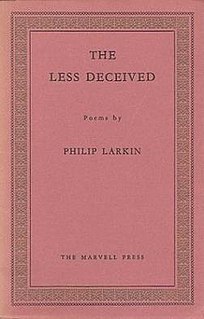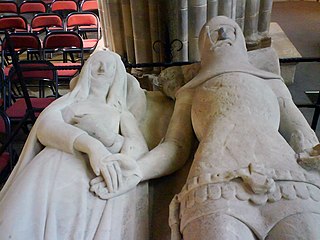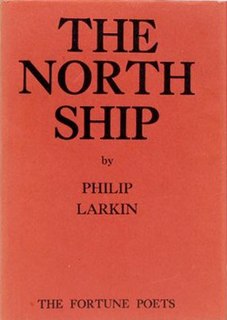
Philip Arthur Larkin was an English poet, novelist, and librarian. His first book of poetry, The North Ship, was published in 1945, followed by two novels, Jill (1946) and A Girl in Winter (1947), and he came to prominence in 1955 with the publication of his second collection of poems, The Less Deceived, followed by The Whitsun Weddings (1964) and High Windows (1974). He contributed to The Daily Telegraph as its jazz critic from 1961 to 1971, with his articles gathered in All What Jazz: A Record Diary 1961–71 (1985), and edited The Oxford Book of Twentieth Century English Verse (1973). His many honours include the Queen's Gold Medal for Poetry. He was offered, but declined, the position of Poet Laureate in 1984, following the death of Sir John Betjeman.

The Times Literary Supplement (TLS) is a weekly literary review published in London by News UK, a subsidiary of News Corp.

Sir Andrew Motion is an English poet, novelist, and biographer, who was Poet Laureate from 1999 to 2009. During the period of his laureateship, Motion founded the Poetry Archive, an online resource of poems and audio recordings of poets reading their own work. In 2012, he became President of the Campaign to Protect Rural England, taking over from Bill Bryson.
Faber and Faber Limited, usually abbreviated to Faber, is an independent publishing house in London. Published authors and poets include T. S. Eliot, W. H. Auden, Margaret Storey, William Golding, Samuel Beckett, Philip Larkin, Ted Hughes, Seamus Heaney, Paul Muldoon and Kazuo Ishiguro.
"This Be The Verse" is a lyric poem in three verses of long measure with an alternating rhyme scheme, by the English poet Philip Larkin (1922–1985). It was written around April 1971, first published in the August 1971 issue of New Humanist, and appeared in the 1974 collection High Windows.

Brunette Coleman was a pseudonym used by the poet and writer Philip Larkin. In 1943, towards the end of his time as an undergraduate at St John's College, Oxford, he wrote several works of fiction, verse and critical commentary under that name, including homoerotic stories that parody the style of popular writers of contemporary girls' school fiction.
Vernon Phillips Watkins was a Welsh poet, translator and painter. He was a close friend of fellow poet Dylan Thomas, who described him as "the most profound and greatly accomplished Welshman writing poems in English".
Anthony Simon Thwaite was an English poet and critic, widely known as the editor of his friend Philip Larkin's collected poems and letters.

The Whitsun Weddings is a collection of 32 poems by Philip Larkin. It was first published by Faber in the United Kingdom on 28 February 1964. It was a commercial success, by the standards of poetry publication, with the first 4,000 copies being sold within two months. A United States edition appeared some seven months later.

High Windows is a collection of poems by English poet Philip Larkin, and was published in 1974 by Faber and Faber Limited. The readily available paperback version was first published in Britain in 1979. The collection is the last publication of new poetry by Larkin before his death in 1985, and it contains some of his most famous poems, including the title piece, "High Windows", "Dublinesque", and "This Be The Verse". The collection contains themes presented in his earlier collections, though the tone of the poems caused critics to suggest the book is darker and more "socially engaged" than his earlier volumes. It is currently on the AQA AS/A2 level English Literature syllabus.

Jill is a novel by English writer Philip Larkin, first published in 1946 by The Fortune Press, and reprinted by Faber and Faber (London) in 1964. It was written between 1943 and 1944, when Larkin was twenty-one years old and an undergraduate at St John's College, Oxford.

The Less Deceived, first published in 1955, was Philip Larkin's first mature collection of poetry, having been preceded by the derivative North Ship (1945) from The Fortune Press and a privately printed collection, a small pamphlet titled XX Poems, which Larkin mailed to literary critics and authors. Unfortunately, Larkin was unaware that postal rates had gone up, and most recipients, when asked to pay the difference for delivery of a pamphlet by a little-known writer, turned them away; only around 100 copies were printed.
The University of Oxford is the setting for numerous works of fiction. Quickly becoming part of the cultural imagination, Oxford was mentioned in fiction as early as 1400 when Chaucer in his Canterbury Tales referred to a "Clerk [student] of Oxenford":
"For him was levere have at his beddes heed/ Twenty bookes, clad in blak or reed,/ of Aristotle and his philosophie/ Than robes riche, or fithele, or gay sautrie".

"An Arundel Tomb" is a poem by Philip Larkin, written and published in 1956, and subsequently included in his 1964 collection The Whitsun Weddings. It describes the poet's response to seeing a pair of recumbent medieval tomb effigies with their hands joined in Chichester Cathedral. It is described by James Booth as "one of [Larkin's] greatest poems". It comprises 7 verses of 6 lines each, each with rhyme scheme ABBCAC.

Collected Poems is the title of a posthumous collection of Philip Larkin's poetry edited by Anthony Thwaite and published by Faber and Faber. He released two notably different editions in 1988 and 2003, the first of which also includes previously unpublished work. Both editions include the contents of Larkin's collections The North Ship, The Less Deceived, The Whitsun Weddings and High Windows, plus other material.

The North Ship is the debut collection of poems by Philip Larkin (1922–1985), published in 1945 by Reginald A. Caton's Fortune Press. Caton did not pay his writers and expected them to buy a certain number of copies themselves. A similar arrangement had been used in 1934 by Dylan Thomas for his first anthology.

Larkin at Sixty (1982) is a collection of original essays and poems published to celebrate the sixtieth birthday of the English poet Philip Larkin. It was edited and introduced by Anthony Thwaite and published by Larkin's publishers, Faber and Faber. A poetic dramatisation of the launch of the book was written by Russell Davies.
Throughout the life of the poet Philip Larkin, multiple women had important roles which were significant influences on his poetry. Since Larkin's death in 1985, biographers have highlighted the importance of female relationships on Larkin: when Andrew Motion's biography was serialised in The Independent in 1993, the second installment of extracts was dedicated to the topic. In 1999, Ben Brown's play Larkin with Women dramatised Larkin's relationships with three of his lovers, and more recently writers such as Martin Amis, continued to comment on this subject.
"Church Going" is a poem by the English poet Philip Larkin (1922–1985) that is generally regarded as one of his masterpieces. Larkin's first draft of the poem was dated 24 April 1954. He worked through 21 pages of drafts, abandoned it, then took it back up, emerging with his final version in July 1954. "Church Going" was published in The Less Deceived. Larkin's fondness for English ecclesiastical architecture, and the seriousness of mood he felt in such places, are apparent in the poem, standing in contrast to his cynicism about Christianity. "Church Going" is notable for its reference to the "cycle-clips" often associated in the popular imagination with Larkin during his lifetime.











